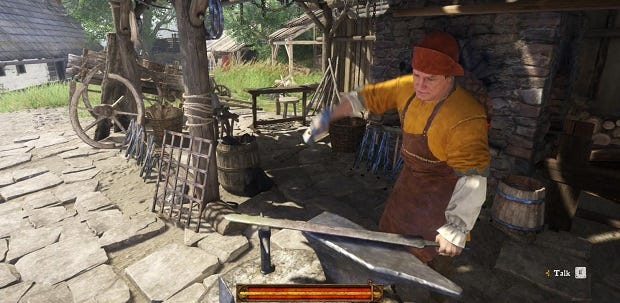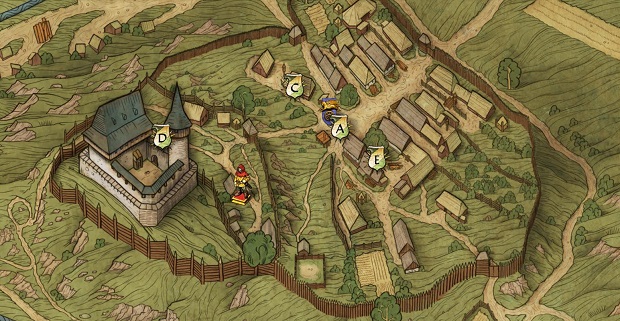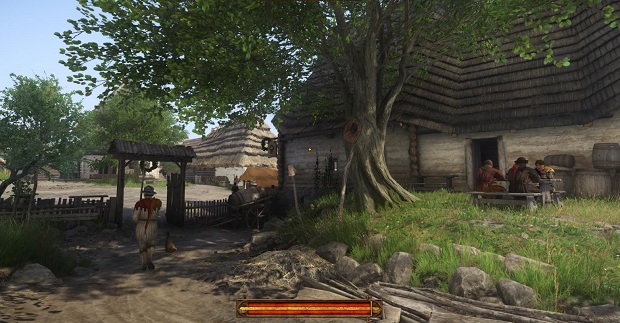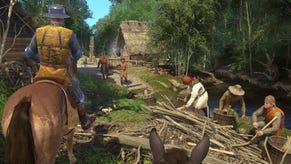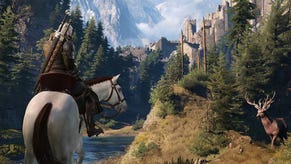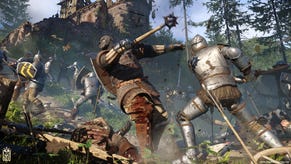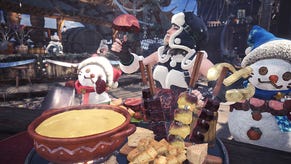On abusing the peasants in Kingdom Come: Deliverance
Clods of war
Kingdom Come: Deliverance [official site] is about the ring of steel on steel, the august machinery of feudal politics and the intricacies of village society. It's also about throwing turds at houses, as I discovered during a hands-off showing of the game's prologue area. The house in question belongs to a man who has been singing the virtues of the German-backed Hungarian invasion of Bohemia at a nearby tavern. As proud Bohemians, it's up to Mr Protagonist and his fellow yokels to defend the country's honour by, in this case, carpet-bombing a small piece of it with dung.
Other fun activities in Kingdom Come include getting drunk whenever you quicksave, because the only way to quicksave is to take a swig of a particularly heady local liquor, which means that overly prudent players risk spending half the game with a crippling hangover. Oh, and if you're really at a loss for direction, you might while away a few hours reducing well-adjusted villagers to sickly introverts by poisoning the cheese, starting brawls at all their favourite watering holes and stealing their fishing equipment. From a distance, Warhorse's much-postponed open worlder can seem rather dour, obsessed with historical accuracy and depth of simulation to a degree that makes you wonder whether this is a game or an interactive monument to a period. But somewhere beneath the boiled leather jerkin of this dragonless Skyrim tribute, there's some of the farce and fanciful nature of a first-person Fable reboot struggling for air.
The period in question is the early 15th century, and you are the whey-faced sprog of a humble blacksmith, scraping a living in the shadow of a castle wall. An hour or so into the prologue, your entire family will be put to the sword by the Hungarian army. Cue a heroic struggle to restore the rightful ruler to the throne. At the outset, however, the task at hand is simply to shop for beer and charcoal, pick up a crossguard from a merchant at the castle and track down a belligerent drunk who owes your dad money.
This last mission proves a small-scale advert for what happens when you mash Kingdom's malleable quest design, day-to-day AI behaviours and arsenal of item variables together. The obvious thing to do is to beat the drunk into submission, but he's stronger than you and besides, that nice cold beer might get warm in your pocket while you're ducking and diving, much to your father's ire. Another option is to break into the guy's hut while he's out drowning his sorrows, steal his work tools and sell them on but, this being one of those cosy backwaters where everybody knows each other, the local tradesman can spot pilfered goods and may refuse to do business.
You could always run crying to your dad for assistance, but it won't be great for your relationship - every NPC in Kingdom Come has an opinion of the player's character, manifest as a reputation bar, and lower reputation has consequences that range from higher prices at market stalls to fewer possibilities in dialogue. Or you could ask your village buddies to clobber the man, after first helping them out with the aforesaid question of national pride. Of course, the village guards won't take kindly to your turd-tossing antics - you may even end up in jail. And while you're in jail, you might bump into somebody else who will change how you think about the situation entirely.
Kingdom Come's tentpole feature continues to be its nerdily in-depth melee combat, which factors in everything from how tired you are through which limbs you target to blades glancing off tree trunks on their way to an enemy's throat. But the more I see of it, the more I think the game's long-term appeal might lie with its AI sandbox. The simulation has a few conspicuous hard limitations - notably, NPCs don't have opinions of each other unless it forms part of a quest storyline, so anybody hoping to plunge a community into civil war, Needful-Things-style, will be disappointed. The broad events of the storyline are also unalterable – this is, after all, a work of historical realism – though your presence is required in order for key scenes to unfold. But within these fairly generous parameters, there's plenty of opportunity for mischief.
Take the realm's regular tournaments. You can choose to enter the listings if you fancy yourself a bit of a Galahad (there are no artificial level-based difficulty gaps in Kingdom Come, but experience with a small “e” and quality of gear naturally count for a lot in combat). Or, if you're more of a Roger Godberd, you could rob nearby settlements while their residents are out enjoying the festivities. Almost every character in the game, from sweaty labourers to haughty princelings, has a routine, a vocation and preferences that can be preyed upon to varying effect. Deny somebody a seat at the pub, and they may choose to drink elsewhere tomorrow. Ransack a forge and the owner may lack the means to create metal products, causing prices to rise.
Some of the guards are faceless obstacles, inserted for the sake of challenge, but many are residents of the area with their own homes and belongings. I'm extrapolating a bit here, but - if you're planning a crime spree, one way to start might be to deprive the garrison of sleep so that all the enforcers are in bed while you're running amok. You'll also want to think about killing witnesses, as word of a misdeed spreads mouth to mouth. And hiding bodies, because if too many villagers turn up dead the others may decide to bear arms.
The biggest question I have at this stage is whether Kingdom Come's narrative – which apparently features scenes of rape and references contemporary perceptions of homosexuality, amongst other difficult topics - will be a sturdy enough foil for the bubbling volatility of the simulation. In the absence of voiced dialogue, character acting or final English localisation, it's hard to get a handle on this at present, but the world's rather lumpy, curly-fonted stylings suggest that CD Projekt, at least, has nothing to fear from the comparison. This and the game's delayed release aside, Deliverance continues to be an inviting alternative to the Elder Scrolls series that trades sorcerers and lizardmen for a big ripe handful of rustic squalor.
Kingdom Come: Deliverance is due for release next year.
